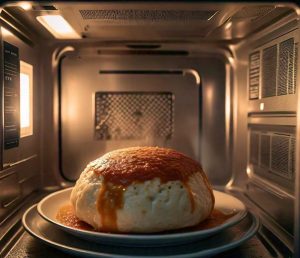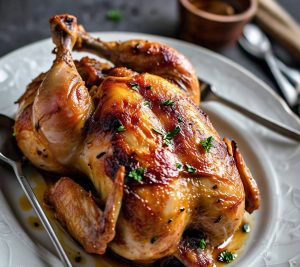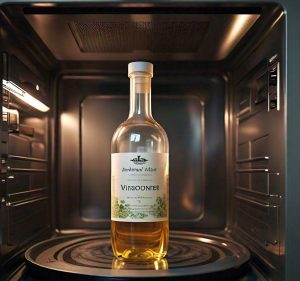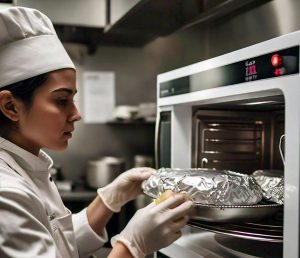Leaving food in the microwave overnight refers to the practice of storing leftover or newly cooked food inside a microwave oven for an extended period, typically from evening until morning.
The question at hand is whether it’s safe and advisable to leave food in the microwave overnight.
This article will delve into details regarding leaving food in a microwave overnight; discussing whether it’s safe, how long you can leave your food there before it becomes unappetizing or potentially hazardous, and if any nutrients or flavors are lost during this period. We’ll also explore alternatives to microwaving and provide tips on proper storage methods for various types of foods. Additionally, we will address frequently asked questions about this topic and offer our final thoughts on safely handling leftovers.

Jump To:
Is it Safe to Leave Food in the Microwave Overnight?
No, it’s not safe to leave food in the microwave overnight. The “danger zone” temperatures between 40°F and 140°F allow bacteria to multiply rapidly. Leaving any kind of food item unrefrigerated for an extended period enhances its susceptibility to bacterial growth, which can lead to serious health risks like food poisoning. Thus, leaving your meal or dish inside a microwave oven or any other similar appliance for one night is not advisable.
Check out what you can put in the microwave.
Facts About Leaving Food in the Microwave Overnight
Here we will discuss the important things to note about leaving food in the microwave overnight.
- Food Safety: According to food safety guidelines, it’s not recommended to leave perishable foods out of refrigeration for more than two hours. If left overnight, this could result in harmful bacteria growth and possibly lead to food poisoning.
- Nutrient Loss: Leaving cooked food at room temperature or warmer can degrade certain nutrients over time, potentially reducing its nutritional value. The longer the food sits out unrefrigerated, the more is the loss of these nutrients.
- Taste Alteration: The taste and texture of your meal might change when left inside a microwave overnight as some meals dry out quickly and may become hard or crunchy due to their prolonged exposure to air.
- Microwave Functioning: Some microwaves have vents that are designed to remove excess heat from the cooking process. An item stored in the microwave might block these vents which could affect its functioning over time.
In conclusion, it’s generally not advisable according to both health and quality perspectives to leave your dishes inside a microwave oven overnight. Now we will discuss some other things about microwaving different types of foods.
Check out what you cannot put in the microwave.
What are the Alternatives to Leaving Food in the Microwave Overnight?
Instead of leaving food in the microwave overnight, there are several safer alternative methods for reheating or storing your meals. These include using an oven or toaster oven for reheating, heating up on a stovetop with appropriate cookware, or refrigerating leftovers properly and quickly after cooking while ensuring they’re sealed in an airtight container. All these approaches can help maintain both flavor and nutrient content of food while also ensuring safety from bacterial growth which can occur due to improper storage conditions.
Check out where you can microwave your food.
Tips for Microwaving Leftovers
Here are a few tips to microwave leftovers:
- Always cover your dish: This prevents drying out and aids even heat distribution.
- Stir frequently during reheating: Ensures consistent heating throughout the dish.
- Avoid overheating: Too much heat might alter taste and texture.
- Microwave-safe containers only: Using non-microwave-safe containers may be harmful.
- Clean your microwave regularly: To avoid lingering smells affecting new dishes’ flavors.
Now that we have discussed these tips on using a microwave more effectively instead of leaving food in it overnight, let’s move forward towards addressing FAQs related to this topic in our next section.

Frequently Asked Questions (FAQs)
In this section, we will explore some of the most commonly asked questions related to microwaving and heating food.
Can you leave food in the microwave overnight?
No, you should not leave food in the microwave overnight. Leaving food at room temperature for extended periods can lead to bacterial growth which can cause foodborne illnesses. It’s always better to refrigerate leftover foods promptly after cooling down.
Is it safe to reheat leftovers in a microwave?
Yes, it is generally safe to reheat leftovers in a microwave if done properly. Make sure that the food is heated evenly and reaches a minimum internal temperature of 165 degrees Fahrenheit to kill any harmful bacteria before consuming.
Does microwaving kill all bacteria?
No, microwaving does not kill all bacteria. While it can reduce their numbers by heating up your food, some heat-resistant bacteria may survive unless the entire dish reaches an adequate temperature throughout.
How many times can you safely reuse cooking oil in a microwave oven?
You should avoid reusing cooking oil more than twice in a microwave oven as its quality degrades with each use due to high temperatures and absorption of previously cooked foods’ flavors and particles.
We hope these answers have cleared up any confusion about using your microwave safely!
Final Word
Microwave ovens are convenient appliances used for reheating or cooking meals quickly; however, proper usage is crucial for maintaining health safety standards like refraining from leaving foods inside overnight without refrigeration or reheating them adequately enough so they reach sufficient temperatures that eliminate harm-causing microbes. Also, remember not to overuse cooking oils within this appliance due to its degradation of quality with each repeated cycle.



